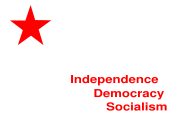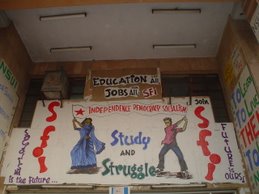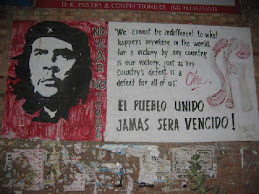Tuesday, July 10, 2012
JNU SFI Unit's Statement Against All India SFI Leadership's Decision to Dissolve SFI-JNU Unit and Expel 4 Delhi State Committee Members from JNU
Sunday, November 28, 2010
Pamphlet 1 February 2010
Pamphlet 25 January 2010
Pamphlet 9 January 2010
Friday, January 30, 2009
SFI Pamphlet dated 3rd January, '09
Down with the Zionist aggression in Gaza! Unite to oppose imperialist US-Israel Gameplan against Palestinians!!
Friends,
For the past one week, the world has been witness to the murderous attacks by Israel in Gaza Strip launched against the Palestinians living there. These severe attacks-which are a continuation of the long-standing war against the Palestinian people-have, resulted in the death more than 400 people, many of them innocent civilians. These attacks have also left many severely wounded and also led to the destruction of vital installations like Gaza University, schools, hospitals and power stations. The Israeli regime under PM Ehud Olmert and Defence Minister Ehud Barak, has reasoned that the attacks were necessary to prevent rocket attacks by Hamas. But the same regime conveniently forgets that it had for months imposed economic siege on Gaza on the arrogant pretext of non-recognition of the legitimate and democratically elected Hamas government. This catastrophic siege had heavily crippled the people of Gaza, one of the most densely populated regions in the world leading to essential supplies and medicines being short in supply. There was also severe shortage of fuel and power. Many aid agencies are reporting the growing scarcity of food and medicines, leading to conditions of massive humanitarian crises. In all its aggressive actions, Israel has the active support and backing of the US that has been well-reflected in the mild and ritualistic statements issued by the UN Security Council. There have been wide-spread reports that these attacks are being used by the ruling parties in Israel, Kadima and Labour to shore up support in the upcoming elections in the country. In this entire scenario, the role of the ruling UPA government is entirely shameful and palpable. Apart from issuing a mild condemnation, the Manmohan Singh government has remained a mute spectator. The government by seeking to have closer strategic relationship with the US and thus kowtowing to its diktats has also sought to deepen its relations with the Zionist regime. India is one of the largest customers of Israeli defence industry. This stands in direct contradiction to our anti-colonial and anti-imperialist legacy of our freedom movement, when we stood shoulder to shoulder with the aspirations ands rights of the Palestinian people. The need of the hour is to rekindle this glorious legacy and stand in full solidarity with the resistance being put up by the Palestinians against this onslaught, despite the blatant surrender by our government. SFI calls upon the students of JNU to rally with the Left-democratic and progressive forces in standing in complete solidarity with the people of Gaza in this hour of crisis.
Monday, December 8, 2008
SFI Pamphlet dated 7th Dec, '08
Public Meeting: Mumbai Terror Aftermath: The Way Forward
Speakers: Com. Nilotpal Basu, Central Secretariat Member, CPI(M)
Prof. Zoya Hasan, CPS, JNU & Member, NCM
Siddharth Varadarajan, Deputy Editor, The Hindu
7th Dec (Tonight) - Sutlej Mess - 9.00 pm
Friends, 7/12/08
The recent terrorist attacks in Mumbai have left a huge sense of insecurity and paranoia within the common people in our country. Not only did the terrorists who attacked various places on 26th November kill almost 200 people including innocent civilians, foreigners and security personnel but they also succeeded in creating a reign of terror all over the country. The fact that an attack of such proportions, which involved heavily armed terrorists with rigorous military training entering the country from the sea route could be executed without there being any clue to our intelligence and security apparatus has left far too many questions unanswered. A leading newspaper has correctly described these attacks as “an affront to the Indian state”.
The moot question which stares us in the face now is what is to be done in the present situation. Of course there is no dearth of opinions on this issue. From the right wing forces led by the RSS-BJP-ABVP which have declared that the test of patriotism and commitment against terrorism lies in military strikes against Pakistan and branding the entire Muslim community in India as terrorists to the politically illiterate media which has embarked on a tirade against politicians and the political establishment without any sense of responsibility, whereby jingoism and anarchy seem to be taking over what should have been an objective and mature response to this crisis situation. Attempts are also being made to describe this as “
As responsible citizens of the country and people who cherish the cause of peace and justice, we must ensure that political common sense does not take a drubbing at this critical juncture. Also any attempts which try and push the country towards military conflicts with
Sd/- P.K.Anand, President, SFI-JNU.
Sd/- Roshan, Secretary, SFI-JNU.









